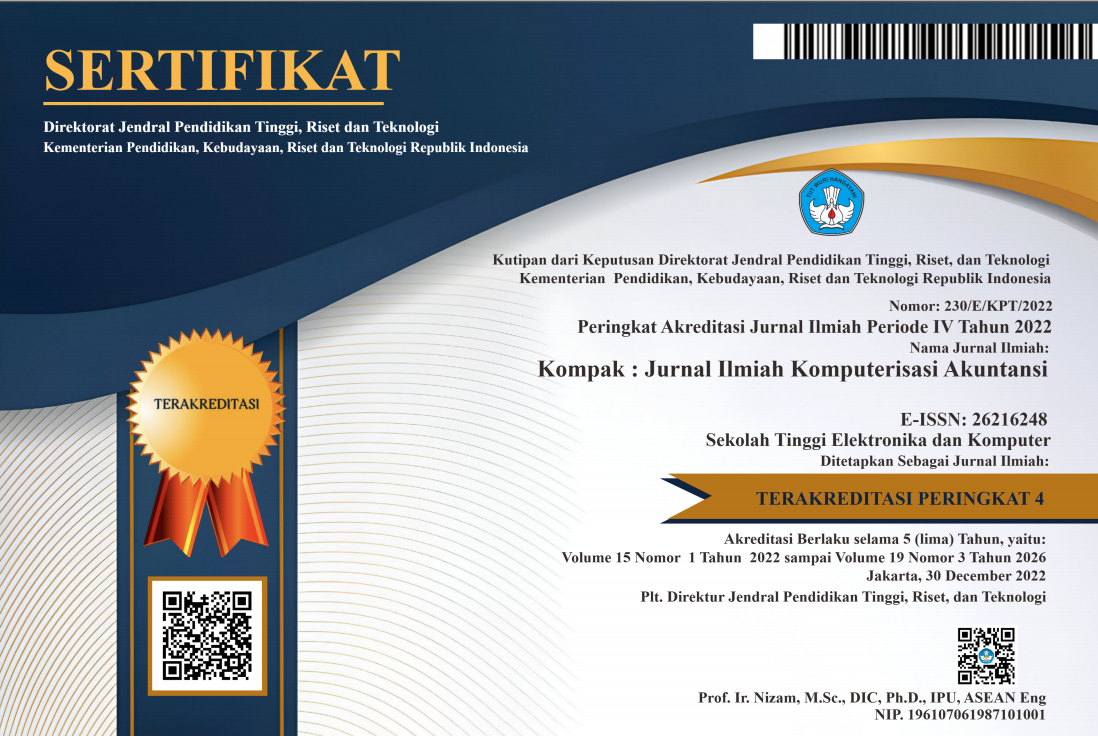Efektivitas Implementasi Sistem Informasi Manajemen Keuangan Daerah di Kabupaten Semarang
DOI:
https://doi.org/10.51903/kompak.v17i2.1907Kata Kunci:
Regional Financial Management Information System (SIMKD), Implementation Effectiveness; Human Resources; Information System InfrastructureAbstrak
The study investigates the efficacy of implementing the Regional Financial Management Information System (SIMKD) in Semarang Regency. Utilizing a qualitative methodology, findings reveal suboptimal effectiveness in SIMKD implementation. Factors influencing this include human resource competency, information technology infrastructure availability, leadership engagement, and organizational culture. Proposed strategies to enhance SIMKD effectiveness encompass developing human resources, fortifying IT infrastructure, fostering leadership commitment, and nurturing a performance-driven organizational ethos. This research contributes theoretically and practically toward optimizing SIMKD utilization for more efficient, transparent, accountable, and effective regional financial administration.
Referensi
[2] Peraturan Pemerintah, Peraturan Pemerintah Republik Indonesia Tentang Perubahan Atas Peraturan Pemerintah Nomor 56 Tahun 2005 Tentang Sistem Informasi Keuangan Daerah (Pp Nomor 65 Tahun 2010). 2010, pp. 1–7. [Online]. Available: http://dx.doi.org/10.1016/j.tplants.2011.03.004%0Ahttp://dx.doi.org/10.1016/j.pbi.2010.01.004%0Ahttp://www.biomedcentral.com/1471-2156/12/42%0Ahttp://dx.doi.org/10.1016/j.biotechadv.2009.11.005%0Ahttp://www.sciencemag.org/content/323/5911/240.short%0Apape
[3] W. Andriani, Z. Baridwan, and S. Suwardjono, “Factors affecting the implementation effectiveness of regional financial management information system in Indonesian local governments,” J. Account. Bus. Dyn., vol. 7, no. 1, pp. 1–14, 2020.
[4] D. P. Sari, R. Wardhani, and D. Martani, “Factors influencing the effectiveness of regional financial management information systems in Indonesian local governments.,” Int. J. Public Sect. Manag., vol. 32, no. 7, pp. 705–721, 2019.
[5] W. H. DeLone and E. R. McLean, “The DeLone and McLean model of information systems success: A ten-year update,” J. Manag. Inf. Syst., vol. 19, no. 4, pp. 9–30, 2003, doi: 10.1080/07421222.2003.11045748.
[6] S. Haryani and H. Juliani, “Challenges in the implementation of regional financial management information systems in Indonesian local governments,” J. Public Adm. Gov., vol. 10, no. 2, pp. 256–270, 2020.
[7] T. Susanto and R. B. Bahaweres, “Factors influencing the acceptance of regional financial management information system: A case study in a local government in Indonesia,” J. Theor. Appl. Inf. Technol., vol. 96, no. 18, pp. 6096–6108, 2018.
[8] B. P. Keuangan and R. Indonesia, “Republik Indonesia Laporan Keuangan Pemerintah Daerah Kabupaten Semarang Tahun Anggaran 2020 Laporan Keuangan,” Kabupaten Semarang, 2021.
[9] BPK Perwakilan Provinsi Riau, “Laporan Hasil Pemeriksaan atas Laporan Keuangan Pemerintah Kabupaten Pelalawan Tahun 2019 Nomor 249/S/XVIII.PEK/06/2020,” Kabupaten Semarang, 2020.
[10] Sugiyono, Metode Penelitian Kuantitatif, Kualitatif, dan R&D. Alfabeta, 2019.
[11] J. W. Creswel, Qualitative, quantitative, and mixed methods approaches. Research Design Qualitative Quantitative and Mixed Methods Approaches. SAGE Publications, 2009. [Online]. Available: http://www.digitallab.wldu.edu.et/bitstream/123456789/3862/1/%28Creswell%29 Qualitative%2C Quantitative%2C and mixed methods 2nd e.pdf
[12] V. Braun and V. Clarke, “Using thematic analysis in psychology,” Qual. Res. Psychol., vol. 3, no. 2, pp. 77–101, 2006, doi: 10.1191/1478088706qp063oa.
[13] Moleong, Metodologi Penelitian Kualitatif. In Metodologi Penelitian Kualitatif, no. Maret. PT Remaja Rosdakarya, 2022. [Online]. Available: https://scholar.google.com/citations?user=O-B3eJYAAAAJ&hl=en
[14] S. Petter, W. Delone, and E. R. McLean, “Information systems success: The quest for the independent variables,” J. Manag. Inf. Syst., vol. 29, no. 4, pp. 7–62, 2013, doi: 10.2753/MIS0742-1222290401.
[15] H. Hendrajaya, Syamsul Hadi, Henry Yuliamir, Dyah Palupiningtyas, and S. Samtono, “Reviewing Employee Work Objectives From Compensation, Facilities and Work Environment, The Affect.,” Brill. Int. J. Manag. Tour., vol. 2, no. 2, pp. 133–142, 2022, doi: 10.55606/bijmt.v2i2.438.
[16] R. J. Utama, “Pengaruh Kompetensi Sumber Daya Manusia, Pemanfaatan Teknologi Informasi, Penerapan Sistem Akuntansi Keuangan Daerah Dan Sistem Pengendalian Intern Terhadap Kualitas Laporan Keuangan Pemerintah Daerah,” J. Online Mhs. Bid. Ilmu Ekon., vol. 4, no. 1, pp. 1429–1443, 2017.
[17] Jamaluddin Dwi Risma, Akuntansi Sektor Publik, no. August. Penerbit Andi, 2021.
[18] D. Palupiningtyas, A. Dewi Maria, T. Adhistyo Wijoyo, A. Prarasdya Alyka, and K. Z. Putri Brawarso, “Application of Rapid Application Development Method in Designing Knowledge Management System to Improve Employee Knowledge and Performance at Ministry of Agriculture,” J. Inf. dan Teknol., vol. 6, no. 1, pp. 29–35, 2024, doi: 10.60083/jidt.v6i1.468.
[19] A. F. Sihura and R. Octafian, “Deciphering Consumer Choices: Axioo Brand Laptop Purchase Patterns at AFA Computer Ambarawa,” Lit. Int. Sci. Journals Soc. Educ. Humanit., vol. 2, no. 3, pp. 10–17, 2023.
[20] F. D. Davis, “Perceived usefulness, perceived ease of use, and user acceptance of information technology,” MIS Q. Manag. Inf. Syst., vol. 13, no. 3, pp. 319–339, 1989, doi: 10.2307/249008.














.png)



